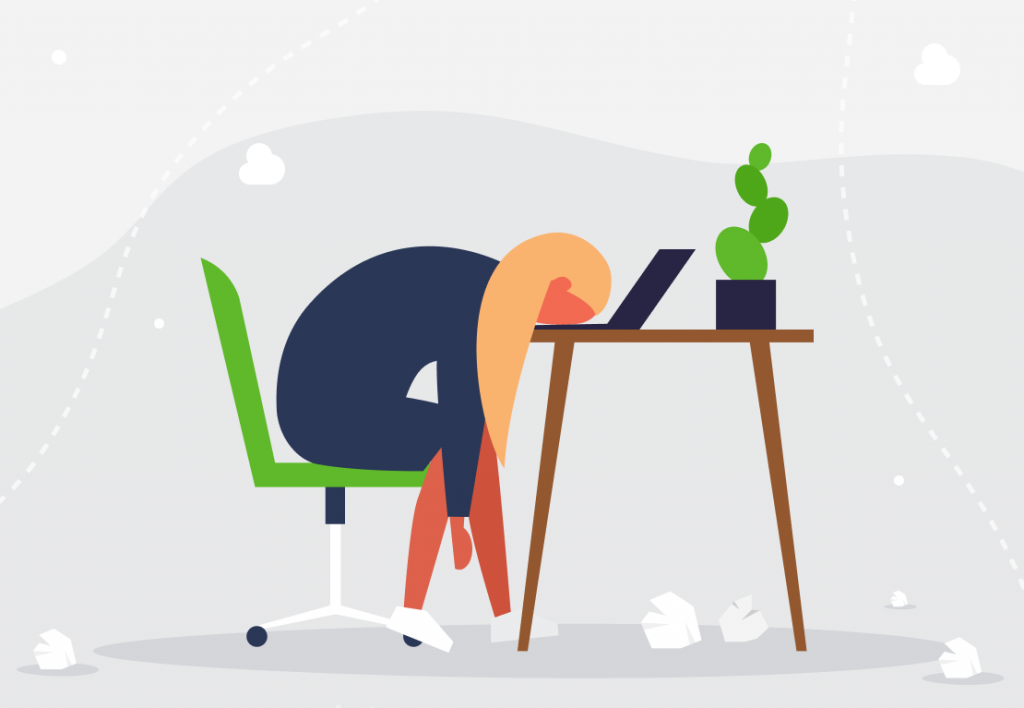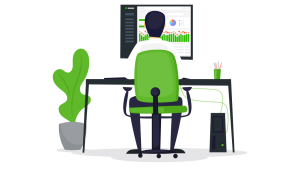Anxiety and productivity: a tricky combination but here’s how to make it work

Anxiety and productivity can seem like an impossible combination. How can one remain productive and efficient when dealing with stress-induced mental and emotional instability?
Unfortunately, with the 21st-century lifestyle side effects, many of us have no other choice but to combine anxiety and productivity daily. Even those who usually manage to complete a lot of their assignments quickly can sometimes feel like the world is collapsing in on them and could be quietly dealing with their internal struggles.
Anxiety-related issues affect business owners, managers, and desk workers every single day. Whether they experience racing thoughts or an overwhelming sense of panic, a person’s symptoms can affect their daily work life. Luckily, with the right approach, tips, and habits, anxiety and productivity can coexist. Keep reading to explore actionable tips on how to be productive with anxiety.
Want to get the most out of your time?
Try DeskTime for free!
Try free for 14 days · No credit card required.
By signing up, you agree to our terms and privacy policy.

#1 How eating the right foods can help with anxiety and productivity
Diet is an essential part of everyday life and can play a significant role in helping with anxiety and productivity. From the first cup of coffee in the morning to the last late-night snack, we’re always eating something to keep our energy levels up or just to savor our favorite foods.
What we eat, however, has an impact on our mood. Diets high in processed sugar, carbs, and fats could increase anxiety symptoms but choosing healthier options can help to be more productive with anxiety.
While changing your diet won’t magically fix the relationship between anxiety and productivity, making a few modifications to what you eat and drink daily can ease some of the struggles.
You don’t have to attempt these changes all at once, either. Start slow and work your way into healthy habits with these anxiety-reducing tips:
Drink water to reduce anxiety and boost productivity
Drinking water prevents you from becoming dehydrated, which can affect your state of mind, and leave you tired and unmotivated. Start with swapping out your post-lunch soda or energy drink for a cold glass of water.
For added flavor, choose a fruit-infused water bottle that adds a healthy dose of Vitamin C to your beverage. Plus, it’s easier to remember to drink water when a stylish bottle is right next to you.
If drinking water is something you’re struggling with, try water reminder apps. There are plenty of options available for any taste – gamified apps, simple reminders, water alarms, and more.
Limit your caffeine intake
Beverages high in caffeine might make you more alert. Still, they can also make you feel jittery and full of nervous energy, which may create even more anxiety and hinder productivity.
Try swapping one of your daily coffees for a fruit smoothie or herbal tea, and you’ll see with time that consuming caffeine is more a matter of habit and not really a necessity.
Start your day with protein
Protein-rich foods keep your blood sugar level stable, which makes you feel more calm and balanced during the day. Thus, when you’re eating enough protein, the chance of turning to sugary snacks that are known to trigger anxiety lessens. Choose protein-rich foods such as eggs, lean meat or fish, nuts, legumes at breakfast to feel full longer and help your body to regulate blood sugar levels.
Consume well-balanced, healthy meals
Fueling your body with balanced meals is always important but when dealing with anxiety it becomes especially important. Choose lean meat or fish, legumes, fruits, vegetables, and whole grains, so you have plenty of energy to keep you focused throughout the day.
Whole, unprocessed foods are rich in fiber and vitamins and help stabilize blood sugar levels crucial for dealing with anxiety and remaining productive.
Smart snacking for anxiety and productivity
Healthy snacks curb hunger and may help reduce anxiety and have a positive effect on productivity. Storing Brazil nuts, yogurt, or dark chocolate as your workplace snacks can help tide you over until lunch or dinner. Vending machines may be affordable, but processed carbs – sweets, pastries, sugary drinks, and so – won’t give you the same benefits as, for example, a protein-rich Greek yogurt.
When you’re eating the right foods, your body feels better, and you’ll have more energy. You can use this steady energy to stay alert, focused, combat anxiety, and remain productive. After you’ve introduced healthy eating habits into your daily routine, you can see which foods have the most significant impact on your stress levels to help you get through anxiety’s mental blocks and boost productivity.
#2 Why it’s essential to be active when dealing with anxiety
Research shows that being active has a positive impact on your mood and may help prevent and treat anxiety. Burning away nervous energy can leave you focused, relaxed, and motivated. If looking for ways to remain productive with anxiety, exercise is a way to go.
Morning exercise, for example, wakes up your body and gets you ready for the day ahead. If you’re exploring fitness solutions and want to know how to calm down when you feel stressed, consider implementing some of these exercises into your daily life.
Stretch
Mental anxiety often has a physical impact on muscle tension, and a good stretch offers some relief. There are many types of stretching exercises you can do while sitting at your desk at work. Or, if you’re comfortable exercising outdoors, you can keep a mat in your car for a quick yoga routine outside during your lunch break.

Want to prevent overworking?
Prioritize and set healthy boundaries!
Step away from your desk
Getting away from your desk for five to ten minutes every hour allows you to refocus and organize your thoughts. It’s especially helpful for those who feel restless all the time – breaks give you a chance to stretch your legs, make a cup of tea, and get your blood flowing.
Aerobic exercise for anxiety and productivity
Workplace stress doesn’t always go away once you leave the office. Scientists have found that as little as five minutes of aerobic exercise can stimulate anti-anxiety effects. Walking, running, and biking are a few activities to try. If you’re feeling too tired or suffering from a lack of motivation, work out with a friend to keep yourself accountable and make the time more enjoyable.
It may be tempting to curl on a sofa after a long and stressful day at work, but going for a brisk walk or a run will be a lot better for anxiety and productivity.
Being active, even for short amounts of time, helps relieve tension and stress from your muscles. It also allows your brain to focus on topics unrelated to work, so you can decompress and pay attention to other aspects of your life that need some TLC. Once you start exercising, you can develop a routine that best fits your daily schedule and offers anxiety-relieving benefits while keeping you productive.
#3 The importance of planning ahead
Having a plan for your day or a strategy for dealing with work tasks and projects keeps you focused and allows you to visualize everything you need to accomplish. Staying organized – whether that entails a new morning routine or changing your desk layout – helps you maximize your day and puts you in a more positive mindset.
What are the planning tips that can help to ease anxiety and boost productivity?
Plan the night before
Laying out what you’re going to wear the next day, creating a bullet-point list, or having a plan of action when you arrive at work has a calming effect. You’ll have an efficient system in place that works for you and helps you to be productive while dealing with anxiety. Plus, if you’re not a morning person, such planning on the night before will be incredibly convenient in your case.
Stay organized
Cluttered, disorganized spaces can lead to increased anxiety and reduced focus that leads to lower productivity. Thus, one of the easiest productivity hacks is maintaining a neat office. Cleaning up and sorting out paperwork and other items on your desk lets you quickly find what you need when working on a project so you can move on to your next objective.
Prioritize your tasks
Prioritizing assignments and tasks can be pretty magical for boosting productivity and reducing anxiety. Once you know what you need to accomplish for the day, putting tasks in order of importance will allow you to get priority assignments finished first.
Top-down lists give you peace of mind knowing that you’ve completed your critical tasks early in the day, keeping you in a good headspace as you stay productive. Plus, checking each item off the list is a visual sign of accomplishment that often boosts motivation.
Whether you’re planning the night before or creating a to-do list of tasks and assignments at work, having a set plan for your workday helps ease the stress and anxiety that you may feel during your shift. Lessening those burdens keeps your productivity high and your focus on your work, not your anxiety.
To conclude: What controlling anxiety means
Those who have anxiety often experience symptoms in a self-perpetuating cycle. People who have high-functioning anxiety usually are able to complete most of their daily tasks without it seeming like a problem. But, in reality, they still struggle with a lack of motivation, racing thoughts, feelings of failure, or a loss of control.
Regaining a sense of control helps empower people who have stressful lives or anxiety, making them more resilient and better able to cope with changes at work and home. Focusing on what you can control and taking charge by coming up with an action plan are the keys to managing symptoms of anxiety that impact your productivity levels.
About the author: Hazel Bennett is a freelance writer and blogger. She has a degree in communications and lives in Northeastern Ohio. Hazel loves writing about numerous topics and showcasing her expertise with words.
Did you find this article useful? Give it a clap!
Psst! You can clap more than once if you really loved it 🙂